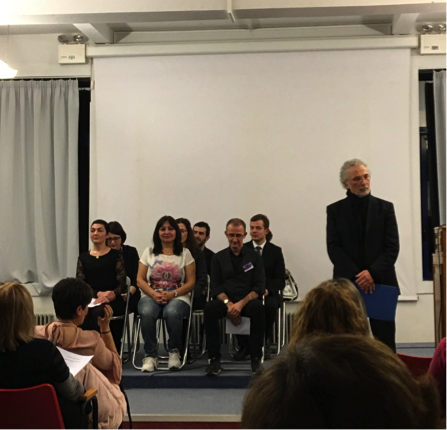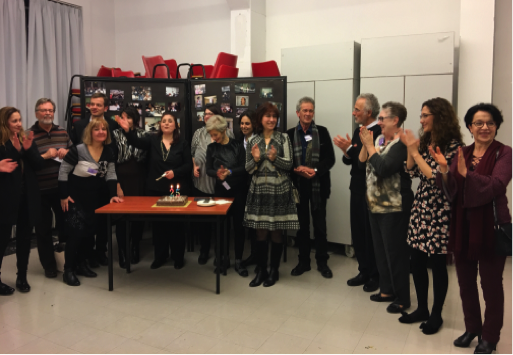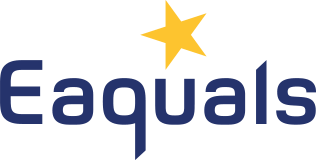Report: TESOL Macedonia Thrace 25th Jubilee Conference by Deniz Kurtoğlu Eken
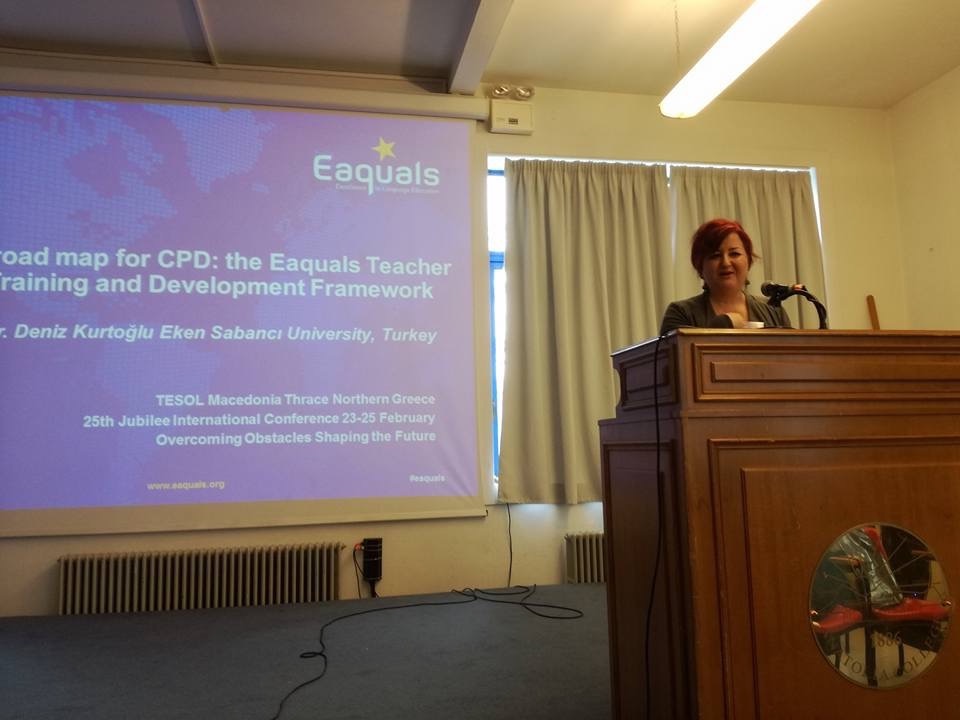
TESOL Macedonia Thrace 25th Jubilee Conference 22-25 February, 2018 Thessaloniki Northern Greece
Deniz Kurtoğlu Eken
I was recently invited to represent Eaquals with a plenary and workshop at the 25th Jubilee Conference of TESOL Macedonia Thrace. The conference was very well organized and attended by a highly motivated group of professionals from Greece and several other countries. I congratulate and thank Maria-Araxi Sachpazian, the Chair of TESOL Macedonia Thrace Northern Greece; Maria Theologidou, the General Secretary; and other Board Members for doing such an excellent job!
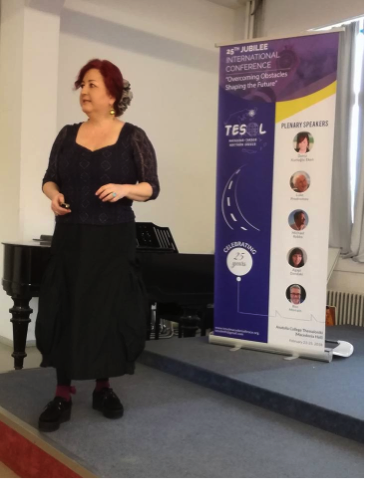 My opening plenary was entitled, A road map for CPD: the Eaquals Teacher Training and Development Framework and my workshop was on, Exploring school effectiveness through appreciative inquiry, institutional research and formative feedback. In the plenary, I discussed the need for the active use of quality frameworks such as the Eaquals TDFRAM exploring the key features that have been contributing to its success with reference to our particular context at Sabancı University School of Languages since its launch in 2013. And in the workshop, we explored practical examples of school development practices which contribute to greater school effectiveness based on appreciative inquiry, institutional research and formative feedback. Before the conference, I was also interviewed by Maria Theologidou, the General Secretary of TESOL Macedonia Thrace Northern Greece. The interview can be accessed on pages 16-18 of the e-Bulletin, ELTeaser February 2018 Issue 65 at: https://drive.google.com/file/d/1oo-XNU1xdioRdLPGHMDO3Su-iPImpdam/view
My opening plenary was entitled, A road map for CPD: the Eaquals Teacher Training and Development Framework and my workshop was on, Exploring school effectiveness through appreciative inquiry, institutional research and formative feedback. In the plenary, I discussed the need for the active use of quality frameworks such as the Eaquals TDFRAM exploring the key features that have been contributing to its success with reference to our particular context at Sabancı University School of Languages since its launch in 2013. And in the workshop, we explored practical examples of school development practices which contribute to greater school effectiveness based on appreciative inquiry, institutional research and formative feedback. Before the conference, I was also interviewed by Maria Theologidou, the General Secretary of TESOL Macedonia Thrace Northern Greece. The interview can be accessed on pages 16-18 of the e-Bulletin, ELTeaser February 2018 Issue 65 at: https://drive.google.com/file/d/1oo-XNU1xdioRdLPGHMDO3Su-iPImpdam/view
And here are some highlights from several sessions I attended at the conference.
Leading Learners to Higher Level Thinking Pre-Conference Plenary by Ron Morrain
This was an excellent session with rich and creative ideas focusing on the use of ready-made mind maps; product oriented tasks and the challenging use of questions to promote higher level thinking skills.
Ron Morrain referred to Tony Buzan’s definition of mind maps: A mind map is a powerful graphic instrument which provides a universal key to unlocking the potential of the brain. It harnesses the full range of cortical skills – word, image, number, logic, rhythm, colour and spatial awareness – in a single uniquely powerful manner.
He then shared a wide range of reasons for using mind maps in teaching. the following highlight the main ones:
– Activate the 4 Cs of learning: Communication, Creativity, Collaboration, Critical Thinking
– A road map which provides organization and help create structure; elicit language and meaning; lead to product creation
– Promote modelling; scaffolding and increased complexity
– Awaken curiosity and promote real life conversations; promote ‘story’ telling; Increase learner confidence in L2
– Reduce text-heavy course books and help avoid prescribed learning built into course books
– Create re-cyleable lessons and help eliminate needless handouts
– Promote learner centeredness; support collaborative learning but expect autonomous learning (the two go hand in hand)
– Voice and choice (Ss. can choose the product themselves e.g. presentation, essay, a video, a survey)
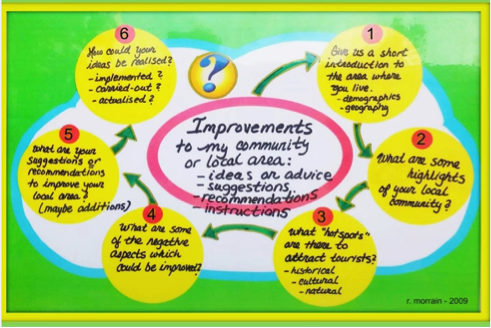
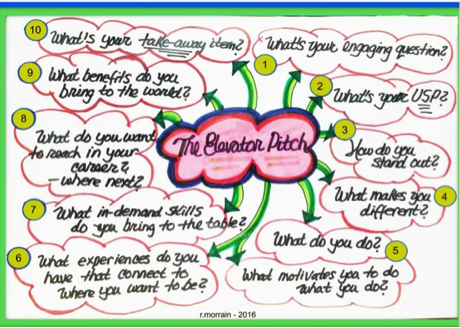
Ron Morrain shared with us a variety of mind maps he created (apparently over 1200!) and encouraged us to prepare one together by working in teams. Our topic was ‘team work’ and our task was to come up with good questions about our topic in a way that would lead to some kind of product. Ron stated that every mind map had to result in a product e.g. a presentation, a survey, an essay, a field trip, a letter, a documentary, a story, picture-based projects with YLs etc. and that as teachers we need to keep in mind the question, ‘What product will this mind map help create?’ Ron also referred to Charlotte Danielson´s Framework for Teaching, highlighting Domain 2 i.e. the classroom environment and added that mind maps contributed to an effective classroom environment, promoting a task based, project based learning approach as well as inquiry based learning. Another important point in Ron Morrain’s plenary was the difference between an activity and a task at which stage Ron encouraged us to have a look at ‘Bloom’s taxonomy with products’ on the Internet after the session. He emphasized that, “A task is not a task unless it has a product”.
Top Ten Secrets of Effective Teaching Plenary by Luke Prodromou
In his plenary, Luke Prodromou started off by inviting us to think about the following questions and to discuss them with a partner:
•What was my first teacher’s secret?
•What did the young learner learn from going on stage?
•What can we learn from being observed?
•Why did ‘bad’ teaching produce a ‘good’ lesson?
•What can our young learners teach us?
•What can teachers tell us?
•What is your favourite metaphor for a good lesson?
•Will being a student again make you a better teacher?
•Has IT made GT redundant?
Luke then shared his own ideas and experiences for each questions. Among the points he highlighted were the importance of providing encouragement for learning; being ‘present’ by using our voice, body language and classroom space effectively; asking students for their views and ideas on ‘good’ teachers; and the importance of rapport. He added that we cannot assume certain qualities, behaviours etc. will always be good in a lesson as doing the right things may not always guarantee effectiveness. Luke also referred to empirical research on effective teaching stating that expertise on teaching related highly to the lesson having a specific language learning focus; the teacher being technically skilled and emotionally intelligent; the teacher having good classroom management skills and using her knowledge to make predictions and use of students’ errors; and interactive decision making in class. Luke Prodromou’s plenary ended with the ‘top ten secrets of effective teaching’ based on responses from a hundred teachers:
1.friendly
2.explained well
3.sense of humor
4.knew the subject
5.patient
6.kind
7.believed in students
8.interesting
9.talked about other things
10.enthusiastic
The 3 Cs to EAP Success Session by Stella Asderi, Georgia Nenopoulou, Nicola Kondoyiannis-Zannis
In this short session the presenters discussed the importance of preparing students for the future and 21st century learning. They highlighted the need – in their academic context and in many others – to incorporate information literacy literacy skills into Freshman courses. The 3 Cs they shared with us for success on EAP course were:
•Critical thinking and problem solving
•Creativity and innovation
•Collaboration and communication
The presenters gave examples of different projects they incorporated into their course to promote these skills including the design of a novel board game by students. They also discussed the challenges involved in designing rubrics for evaluating the 3 Cs, but felt they were happy with the end products and that the criteria worked well.
At the end of the conference day, we were also fortunate to attend a performance by Luke and Friends called, ‘Ladies in Love and Marriage’ and a lively celebration of the 25th Jubilee of TESOL Macedonia Thrace.
